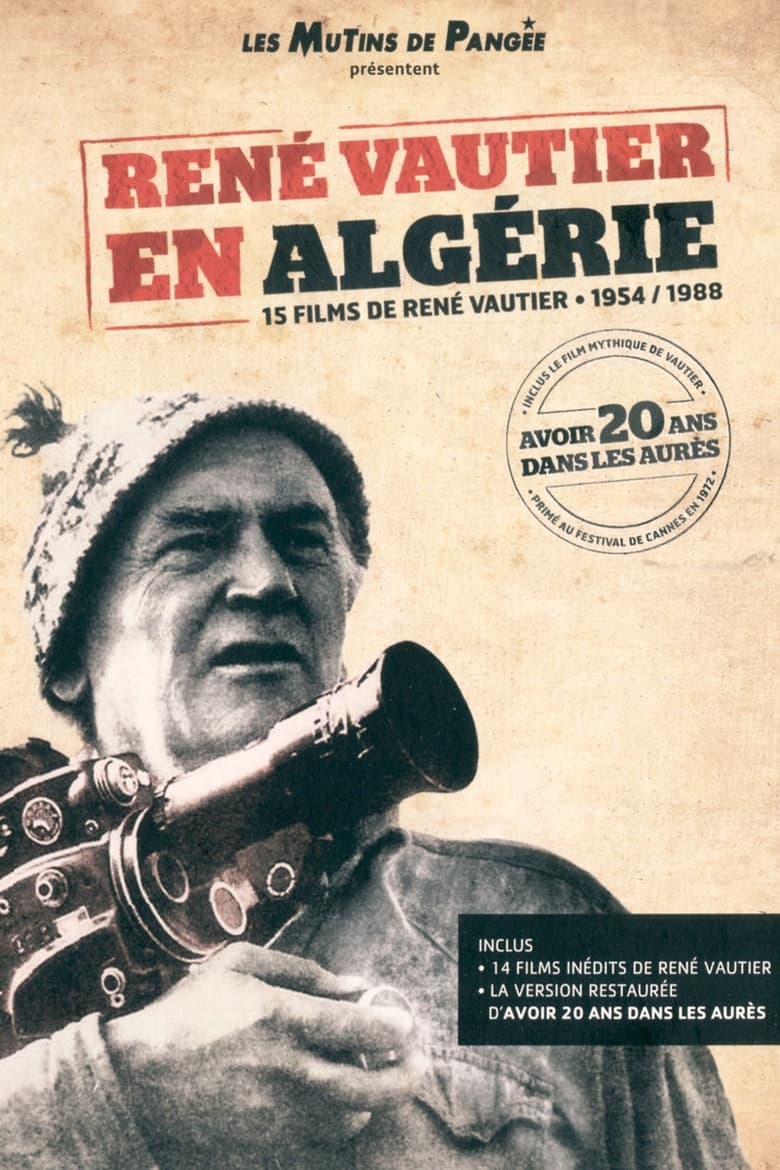

Déjà le sang de mai ensemençait novembre
Genres
Overview
The essay by René Vautier, "Déjà le sang de Mai ensemençait Novembre", starts with the recapitulation of the representations of Algeria throughout the history of visual arts in France in an effort to explore the causes for the quest for independence.
Details
Budget
$0
Revenue
$0
Runtime
61 min
Release Date
1982-01-01
Status
Released
Original Language
French
Vote Count
2
Vote Average
9
Kateb Yacine
Himself
10.0
René Vautier, le maquisard à la caméra
2000-01-01 | fr
10.0
Daniel Timsit, l’Algérien
2009-01-01 | fr
0.0
A Minha Avó Trelotótó
«My grandma had a great strength and love for life which made me believe that some of us were able to become immortals and escape death. When she passed at the age of 92, her death was a surprise to me, which I was not prepared for. The cinema has the immense power of creating the illusion of life and its protection. This film is my attempt to rescue my grandma from death. It is not a documentary about my grandma but a film with my grandma. I wanted to film a ghost and then return it to the realm of the living, like Orfeu tried with Eurídice. It is a route to resurrection. It is my way of giving her immortality which I deem to be her right.»
2019-05-06 | pt
10.0
Cheikh El Hasnaoui, from the White House to the Blue Ocean
Cheikh El-Hasnaoui is an Algerian singer who left his country in 1937 without ever setting foot there again. Between 1939 and 1968 he composed most of his repertoire in France. For many years the Algerian cafes of Paris were the stages of his shows. With a handful of artists of his generation, he laid the foundations of modern Algerian song. A fervent defender of women's rights, he claims, as a pioneer, the fight for identity for a plural Algeria. At the end of the Sixties, he ended his artistic career. On July 6, 2002 he died in Saint-Pierre de la Réunion, where he is buried to this day. This 80-minute documentary follows in the footsteps of this extraordinary character. From Kabylia to Saint-Pierre de a Réunion via the Casbah of Algiers and the belly of Paris.
2014-04-10 | fr
0.0
Scream
An experimental essay film about terrorism, media, violence and globalisation. Three infotainment news broadcasts - a rollercoaster, a hijacking, and an influencer - are soundtracked by pulsating experimental electronics that push the psychic residue of a post war-on-terror world out of the unconscious and onto the screen. Capitalism, imperialism, desire; all three are implicated in a nihilism that has seeped from the news into the social psyche.
2021-04-12 | en
7.8
Song from the Forest
25 years ago, Louis Sarno, an American, heard a song on the radio and followed its melody into the Central Africa Jungle and stayed. He than recorded over 1000 hours of original BaAka music. Now he is part of the BaAka community and raises his pygmy son, Samedi. Fulfilling an old promise, Louis takes Samedi to America. On this journey Louis realizes he is not part of this globalized world anymore but globalization has also arrived in the rainforest. The BaAka depend on Louis for their survival. Father and son return to the melodies of the jungle but the question remains: How much longer will the songs of the forest be heard?
2014-09-11 | en
0.0
Baobab Play
Children and teenagers throw sticks, berries, and leaves at each other from perches in a large baobab tree.
1974-01-01 | en
6.9
Finding Fela
Fela Anikulapo Kuti created the musical movement Afrobeat and used it as a political forum to oppose the Nigerian dictatorship and advocate for the rights of oppressed people. This is the story of his life, music, and political importance.
2014-08-01 | en
7.0
Concerning Violence
Concerning Violence is based on newly discovered, powerful archival material documenting the most daring moments in the struggle for liberation in the Third World, accompanied by classic text from The Wretched of the Earth by Frantz Fanon.
2014-01-17 | sv
10.0
René Vautier, le rebelle
2000-04-29 | fr
0.0
The last Balafon Master
| de
10.0
Li Fet Met (Le passé est mort)
The SAS (Section Administrative Spécialisée) were created in 1956 by the French army during the Algerian war to pacify "the natives". During the day, the SAS were used as treatment centres and at night as torture centres, in order to crush the Algerian resistance. The SAS were inhabited by French soldiers and auxiliaries (harkis, goumiers) and their families. At independence in 1962, a few families of auxiliaries stayed on; the vacant buildings were occupied by families of martyrs awaiting the better days promised by the new Algeria. 46 years later, the SAS at Laperrine, in the Bouira region, still exists, a unique place inhabited by people who have taken refuge there. They have been joined by farmers fleeing the terrorism of the 90s. They all live as best they can in a place they did not choose, suffering the consequences of war.
2007-01-01 | fr
0.0
British Settler Life in Kenya
This 1944 black and white silent film provides brief glimpses of the lifestyle among Kenya's white/European settlers during the Second World War.
1944-09-01 | en
10.0
Kamel Hamadi, Ger Yenzizen
Portrait of the Algerian singer and composer Kamal Hamadi (husband of the singer Noura). Performer, musician, conductor, lyricist, author and composer, he is considered today as the witness par excellence of Algerian artistic action of the 20th century. The film received the Golden Olivier for best documentary 2010 at the Tizi-Ouzou Amazigh Film Festival in Algeria.
2010-01-01 | ar
0.0
I Will Speak English
'An instructional film made on behalf of the Department of Social Welfare, demonstrating a new technique to teach English to illiterate adult audiences in the Gold Coast. (..) This is a film with an almost entirely African cast, depicting an African teacher instructing a group of African students, produced by a predominantly African crew. Yet, the subject of the film – encouraging the widespread teaching of English – jars with this image of a modern Gold Coast. Just as the Gold Coast Film Unit was overseen by British figures – such as Sean Graham and, in this case, George Noble – this film also endorses the retention of British influence within a new national identity'. - Tom Rice, for colonialfilm.org
1954-09-01 | en
0.0
Le point de vue du lion
2011-01-01 | fr
10.0
Oversand
1981-01-01 | fr
8.8
Liyana
A talented group of orphaned children in Swaziland create a fictional heroine and send her on a dangerous quest.
2017-07-15 | en
0.0
Yes-Ja! The Kwaito Documentary
A musical trip through southern Africa to the tunes of the post-apartheid generation. Kwaito music originated in the 1950's in the dusty streets of South Africa's townships such as Sophiatown, Pimville and subsequently in Soweto. It is inseparable from the Pantsuela culture of the rebellious youth gangs during the Apartheid regime. Since there was no money for musical instruments or for extravagant costumes, they concentrated on their dancing and singing skills and, turning the streets into their stage. Currently almost fifty years later - Kwaito culture is experiencing a renaissance in a manner completely inconceivable in those days.
2011-02-15 | en
0.0
Africa: Land and People
This film takes a close look at Africa's varied geography and the people who settled and live in these region. Also it contrasts the rural villages and the modern cities.
1990-01-01 | en